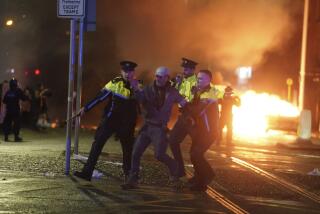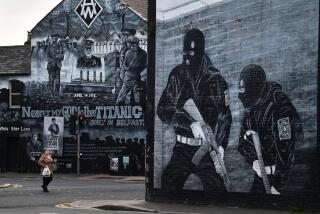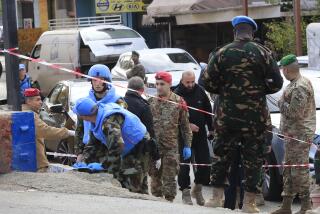IRA Proxy Bombings Kill 6 Troops, Civilian : Northern Ireland: The attack by the terrorist group is the deadliest against British forces in two years.
- Share via
BELFAST, Northern Ireland — The Irish Republican Army executed its most deadly attacks on British forces in two years Wednesday, forcing civilians to deliver car bombs that killed six soldiers in nearly simultaneous incidents at two border checkpoints. One civilian also died and at least 20 people were wounded, officials said.
According to the widow of the civilian victim, Patsy Gillespie, he was ordered by IRA gunmen to drive a car packed with an estimated 1,000 pounds of explosives into the Londonderry border post about 4 a.m. Gillespie and five soldiers were killed, and 10 people were injured.
About 15 minutes later, a van exploded at a checkpoint south of Newry, although the driver, a 65-year-old man whose family was being held hostage by the IRA, was able to shout a warning before the bomb went off. One soldier died and 10 others were wounded in that incident.
The driver at Newry suffered a broken leg as he dashed from the car seconds before it blew up.
The blasts at opposite ends of the province were believed to be in retaliation for the fatal shooting two weeks ago of Dessie Grew, a leading IRA gunman suspected of several killings in Northern Ireland and Europe.
The day’s violence could have been even worse. A third car bomb, piloted by a man who had been beaten and tied to the driver’s seat, failed to explode fully outside a police station in Omagh, about midway between the sites of the two other blasts.
All three coerced drivers apparently were targeted by the IRA because they worked in British security installations--an IRA tactic, in effect, to kill two birds with one stone.
“All three of these people worked for . . . British forces,” said Richard McAuley, a spokesman for Sinn Fein, the IRA’s legal political wing. “In other circumstances, the IRA would have been trying to kill these people anyway.”
Gillespie, a cook at the Ft. George police barracks in Londonderry, four months ago had been ordered to drive his wife’s car, packed with 200 pounds of explosives, to his work address.
“But that time he came home,” his tearful widow, Kathleen, said in an interview at her Londonderry home. The masked IRA gunman this time had said her husband would be returned home within half an hour.
“I’m so angry, so devastated,” she said. “I just can’t believe people could be so cruel to make somebody do this. . . . What am I going to do?”
Peter Brooke, secretary of state for Northern Ireland, vowed before the House of Commons in London that the escalation of the IRA terror campaign would not derail his currently foundering efforts to forge talks between the predominantly Protestant Unionist parties, which favor continued unity with Britain, and the Catholic nationalist Social Democratic and Labor Party.
An array of British and Irish politicians condemned as “ghoulish” Wednesday’s use of civilians in so-called “proxy” bomb attacks, part of the IRA’s 20-year campaign to force a British troop withdrawal from the province.
“Proxy bombing is the most lethal form of bombing because it is so hard to detect. It is also the most cowardly,” said Seamus Mallon, deputy leader of the Socialist party and the member of Parliament representing Newry.
“To use a 65-year-old man to do this, to kill in this way,” he said, “is not just an act of barbarity, it is an act of sheer cowardice.”
Police in the Republic of Ireland detained five men Wednesday in Letterkerny, just across the border from the bombed Londonderry checkpoint, on suspicion of participation in the bombing.
More to Read
Sign up for Essential California
The most important California stories and recommendations in your inbox every morning.
You may occasionally receive promotional content from the Los Angeles Times.










